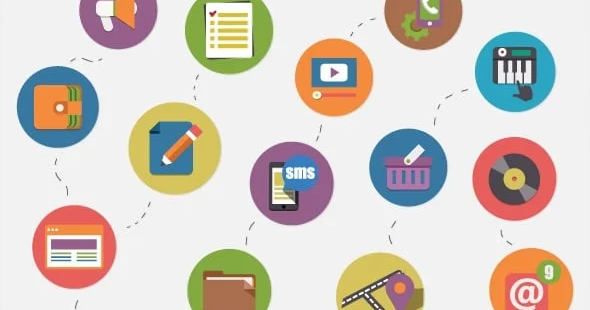Email marketing [2021] again most important channel for B2B
Email marketing is still growing. Also in B2B. In fact, 81 percent of marketers consider e-mail marketing the most important channel for communicating with their target audience. What explains their enthusiasm for this popular online marketing channel?
What is email marketing?
Email marketing is a proven form of marketing where you use emails to connect with your target audience. Although e-mail marketing is the oldest field within online marketing, it is still evolving. Whereas a few years ago companies used e-mail marketing for mass communication, today e-mails are much more personal. With smart email automation software, you can respond much better to the individual needs of the recipient. And that's reflected in the results.
Not surprisingly, the use of email marketing continues to grow. 33 percent of companies will increase the budget for email marketing in 2021, also in B2B. And a staggering 52 percent of companies resolve to spend at least the same budget as last year on email marketing. On average, companies spend about €10,000 per year on this popular marketing tool, Team ITG's email benchmark shows.
The Email Benchmark 2021 consists of figures and email ratios from more than 50,000 email marketing campaigns from 2020. An important fact is that 2020 was different than usual because of the corona crisis.
Why do businesses use e-mail marketing?
Branding, more sales, more leads, retention, service: these are just some of the objectives for which email marketing is used. Its versatility and effectiveness (more on that later) explains why more than 90 percent of companies (SMEs and larger) use email marketing.
In fact, email marketing was voted the most important online marketing channel by the respondents of the email benchmark. 81 percent(!) of respondents named email marketing among the top three channels. This makes it more top of mind than website (70 percent) SEO (38 percent), social media (35 percent) and SEA (31 percent).
Another key insight in that 78 percent of marketers use email marketing to generate traffic to the website. Second mentioned by 74 percent is boosting sales, such as through cross- or upselling. Furthermore, 66 percent mention branding, 60 percent provide service (think of emails around the ordering process in an online store) and 52 percent generate leads.
Lead generation cannot be seen separately from lead nurturing, in which a company guides potential customers through the customer journey with the help of relevant content.
Leads constantly receive new content via e-mail that answers the questions in the phase in which the recipient is currently in.
Email marketing remains the most important online marketing tool for B2B
The study proves once again the power of email marketing in B2B. In fact, mailings in the B2B market outperform emails aimed at consumers. The research is very useful for email marketing consultants who can take advantage of this and adapt their email marketing strategy accordingly.
B2B emails score better on relevance, are opened more often and benefit from a higher click rate. Some 34.27 percent of B2B mailings are opened. For B2C, that rate is 32.49 percent. The click rate of B2B mailings is 2.69 percent, compared to an average of 2.27 percent for B2C. In B2B, by far most clicks still come from the desktop, although mobile devices are gaining ground.
82 percent of email marketers rate the success of a campaign on the click rate. Open rate is a close second at 78 percent, followed by conversion at 66 percent. But few marketers are judged on ROI; only 25 percent look at this.
The benefits of email marketing
It should be clear that email marketing is among marketers' favorite tools. Logical, considering the number of benefits:
- Everyone has e-mail and e-mail belongs to everyone.
E-mailsare there to stay. Almost every Dutch person has an e-mail address, often even several. So you can reach almost everyone. And completely according to your own rules of the game, because unlike social media or the search engine, there is no tech giant changing the algorithms (reducing your reach). No, in email land no one is in charge of your database, your emails and the data you collect. And that's a big advantage. - Low and predictable costs
Email marketing is affordable. Do the math: how much do you pay for your email marketing software? And how many people can you reach with it? The cost per recipient is many times lower than any other marketing tool. And a fraction of the "old-fashioned letter" of yesteryear! Also, the costs are predictable. You know in advance approximately what budget you need for a campaign. - An accepted medium for advertising
E-mail is the only medium where people choose to receive advertising. - High Return on Investment (ROI)
The ROI of email marketing is attractive. Very attractive even, because several studies show that every euro you spend on email marketing generates on average around €40 in sales. Imagine what that means ... even half is worth it! - Email can be personalized
Email marketing software is developing rapidly. Especially also in the field of personalization. The more personal, the more relevant and thus the more effective, is the thinking here. Personalization is no longer about the salutation in an e-mail, today you can tailor your entire B2B campaign to the customer journey. - Measurable
Email marketing is excellently measurable. You know how many people receive your emails, how often they open the email and the number of clicks. You can also see how many conversions this results in on your website. The benefits speak for themselves. You predict your ROI more easily and with A/B testing you optimize your emails to improve results.
Yet email marketing also brings challenges. After all, recipients decide whether they want to continue receiving emails and can unsubscribe. At that point, you are no longer allowed to send emails, the AVG legislation stipulates. At the same time, this does force organizations to take email marketing seriously and keep the quality of the medium high. Another challenge is that it takes time to build a qualitative database. As a result, you often only see the first results after a few months. Advertising often delivers results faster, even though the ROI is ultimately a lot lower.
The challenges and trends of email marketing
Marketing automation has been booming in recent years. Listed last year as the biggest trend, marketing automation has now become commonplace. These software solutions are becoming increasingly intelligent and capable of substantially improving the ROI of sales departments.
Despite the great benefits of marketing automation, it is not a quick fix. Many marketers also experience this, with as many as 60 percent citing marketing automation as their biggest challenge. What do they come up against? Personalizing e-mails is found difficult, says 43 percent. 42 percent also mention segmenting, or, "how do you classify the members of your email list in a meaningful way?
Improving email campaigns therefore has the attention of marketers, with their main focus this year on data-driven campaigns (51 percent), closely followed by 360-degree customer profile (45 percent).
Email marketing software
The market for e-mail marketing solutions is crowded; the supply can be overwhelming. Yet there are major differences between software solutions. For example, it is very valuable to see e-mail marketing in a broader perspective. Ideally, you want to combine the data you collect using email marketing with other data so you can optimize the whole commercial process.
HubSpot is a popular all-in-one solution for marketing and sales in the B2B market. Hubspot offers not only email marketing functionality, but also a CRM system and the ability to manage your website in Hubspot. This has the advantage that you have influence over the entire customer journey, from the first contact moment to satisfied customer.
These CRM and CMS functionalities allow you to collect a lot of valuable data about your customers with which you can increase the ROI of your email marketing. Qualitative data is the basis of an effective data-driven campaign. HubSpot thus offers a solution to the main challenges of the modern email marketer; email marketing automation and personalization.

Want to get the most out of HubSpot? Subscribe to our newsletter, follow us on LinkedIn, or attend our HubSpot User Days!
Explore HubSpot User DaysShare this
You May Also Like
These Related Stories

Email marketing for B2B most important marketing channel

Many B2B companies miss important opportunities

